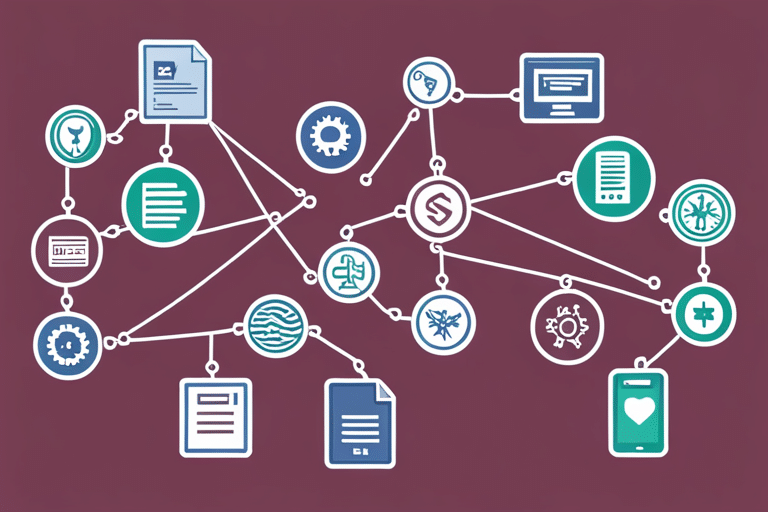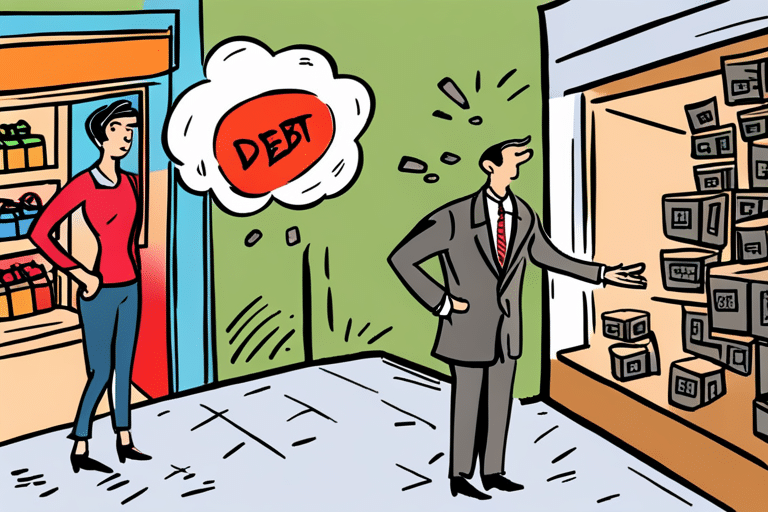Hey, you! So you thought debt management would be a breeze, huh? Well, buckle up because unexpected hurdles are about to come your way. But don’t worry, we’ve got your back!
In this article, we’re going to dive into the root causes of debt and show you how to overcome them like a pro. From high interest rates to financial emergencies and impulse buying temptations, we’ll equip you with the tools you need to navigate these challenges and take control of your financial future.
Let’s get started on this wild ride together!
Key Takeaways
- Identifying and understanding the root causes of debt is crucial for overcoming it.
- High interest rates can have a significant impact on debt management, but negotiating for lower rates or exploring alternative borrowing options can help.
- Building an emergency fund and utilizing community resources can help in handling unexpected financial emergencies.
- Understanding triggers for impulse buying and implementing strategies to resist it can lead to better financial stability.
Identifying the Root Causes of Debt

You need to start by identifying the root causes of your debt in order to effectively overcome it. It’s like solving a puzzle – you have to find the pieces that are causing your financial struggles and put them together to break free from the cycle of debt. This is where root cause analysis comes into play.
Root cause analysis is all about digging deep and getting to the bottom of why you ended up in debt in the first place. Was it because of overspending? Unexpected medical bills? Or maybe it was a combination of factors that led you down this path. Whatever the reasons may be, understanding them is crucial for finding a way out.
Think back to when your debt started piling up. Were there any specific events or circumstances that triggered it? Maybe it was that shopping spree you went on after a bad day at work, or perhaps it was taking out multiple loans without fully considering the consequences.
By identifying these root causes, you can gain valuable insight into your spending habits and make necessary changes to prevent falling into debt again in the future. Understanding why you got into debt will also help you develop a plan tailored specifically to your situation.
Now that we’ve explored how important root cause analysis is for breaking the cycle of debt, let’s move on to understanding another significant factor – high interest rates and their impact on your finances…
Understanding the Impact of High Interest Rates

Hey there, ready to dive into the wild world of interest rates?
Buckle up, because we’re about to explore how those sneaky little numbers can impact your financial life.
From the implications they have on your loan repayments to the strategies you can use to overcome high rates, get ready for a wild ride!
Interest Rate Implications
Understanding the implications of interest rates is crucial in effectively managing your debt. Interest rate fluctuations can either make or break your financial situation. It’s like riding a roller coaster – one moment you’re soaring high with low rates, and the next you’re plummeting down with sky-high rates.
But fear not! There are ways to navigate this wild ride. One key strategy is interest rate negotiation. Just imagine yourself as a smooth talker, charming those lenders into lowering those pesky rates. It may sound daunting, but it’s actually quite empowering.
Negotiating for lower interest rates can save you tons of money in the long run. So put on your negotiating hat and show those lenders who’s boss! Trust me, mastering this skill will have you conquering any debt obstacle that comes your way!
Overcoming High Rates
To conquer high interest rates, take control of your finances by exploring alternative borrowing options. Don’t let those pesky rates hold you back from achieving financial freedom! It’s time to overcome debt fatigue and tackle those high rates head-on.
One strategy for negotiating lower rates is to shop around and compare offers from different lenders. You never know what kind of deals you might find!
Another option is to consider refinancing your loans or consolidating your debts into one manageable payment. By taking the initiative and exploring these alternatives, you can regain control of your financial situation and start saving money in the long run.
So don’t be afraid to get creative and think outside the box when it comes to conquering those high interest rates!
And speaking of unexpected financial emergencies…
Dealing With Unexpected Financial Emergencies

Dealing with unexpected financial emergencies can be challenging, but there are strategies to overcome them. Life has a way of throwing curveballs our way, whether it’s an unexpected medical expense or coping with job loss. But fear not, my friend! Here are four savvy tips to help you navigate these tricky situations:
-
Build an emergency fund: Set aside some money each month specifically for unforeseen expenses. Think of it as your safety net, ready to catch you when life throws a financial curveball.
-
Prioritize and negotiate medical bills: Medical expenses can be overwhelming, but don’t panic just yet! Take the time to carefully review your bills and see if there are any errors or unnecessary charges. Then, don’t be afraid to negotiate payment plans or ask for discounts.
-
Tap into community resources: If you find yourself facing job loss or struggling financially due to medical expenses, reach out to local organizations that offer assistance programs or support services. Remember, you’re not alone in this journey!
-
Stay positive and proactive: It’s easy to feel overwhelmed during times of financial stress, but remember that setbacks are temporary. Keep a positive mindset and take proactive steps towards finding new employment opportunities or exploring ways to reduce your medical expenses.
By following these strategies, you’ll be better equipped to handle unexpected financial emergencies with confidence and resilience.
Now let’s dive into the next topic: overcoming the temptation of impulse buying…
Overcoming the Temptation of Impulse Buying

So, you’ve found yourself in the dangerous territory of impulse buying, huh? Don’t worry, we’ve all been there.
In this discussion, we’ll explore what triggers those impulsive shopping sprees, share some clever strategies to resist them (because willpower alone won’t always cut it), and shed light on the long-term financial impact that can sneak up on you if left unchecked.
Ready to dive in and conquer your impulsive urges? Let’s go!
Impulse Buying Triggers
One of the biggest challenges in managing debt is resisting impulse buying triggers. It’s like a never-ending battle between your desires and your financial goals. But fear not, dear reader, for I have some tips to help you identify those pesky triggers and develop self-control:
-
The Sale Sign Syndrome: Just because something is on sale doesn’t mean you need it. Take a deep breath and ask yourself if it’s something you truly want or just a shiny distraction.
-
Social Media Envy: Seeing everyone’s perfectly curated lives can make you feel like you’re missing out. Remember that what you see online isn’t always reality, and resist the urge to splurge just to keep up with the virtual Joneses.
-
Stress Shopping: When life gets tough, retail therapy can seem oh-so-tempting. Instead of reaching for your credit card, try finding healthier ways to manage stress like going for a walk or practicing meditation.
-
Impulsive Online Browsing: Online shopping makes it too easy to click ‘add to cart’ without thinking twice. Before making any purchase, step away from the screen for a few minutes and reconsider if it’s really worth it.
Strategies for Resisting
Resisting impulse buying triggers can be challenging, but with the right strategies in place, you can overcome them and regain control of your finances. It’s all about self-control and resisting temptation. So, here are some strategies that will help you stay on track:
| Strategies for Self Control | Resisting Temptation |
|---|---|
| Create a budget | Avoid window shopping |
| Track your spending | Don’t shop when emotional |
| Set financial goals | Unsubscribe from sales emails |
Creating a budget is essential because it gives you a clear picture of where your money is going. When you track your spending, it becomes easier to identify unnecessary purchases. Setting financial goals helps to keep your focus on the bigger picture and motivates you to resist impulse buying. And don’t forget to unsubscribe from those tempting sales emails! Remember, mastering self-control takes time and practice. By implementing these strategies, you’ll be well on your way to regaining control of your finances and avoiding impulsive purchases. Keep up the good work!
Long-Term Financial Impact
To fully understand the long-term financial impact of impulsive buying, you need to consider how it affects your savings and future financial goals. It’s not just about that momentary rush of excitement when you swipe your credit card. No, my friend, there are deeper consequences at play here.
Let me break it down for you:
-
Depleting your savings: Impulsive buying eats away at the money you could be putting towards your long-term financial goals.
-
Accumulating debt: Those little splurges can quickly add up, leaving you drowning in a sea of credit card bills.
-
The psychological toll of debt: Living with mounting debt can take a toll on your mental health and overall well-being.
-
Hindering future opportunities: Being weighed down by debt can limit your ability to invest, save for retirement, or pursue other dreams.
Managing Debt While Living on a Tight Budget

Living on a tight budget can make managing debt more challenging, but hey, don’t fret! You’ve got this! It’s time to buckle down and get creative with your finances. Living frugally is the name of the game here. So, let me give you some tips to conquer that debt while still keeping your sanity intact.
First things first, creating a budget is essential. Take a deep breath and grab that pen and paper. Start by writing down all your income sources and then list out every single expense you have (yes, even those sneaky little coffee runs). This way, you’ll have a clear picture of where every hard-earned penny is going.
Now that you have your budget in place, it’s time to tighten those purse strings. Look for ways to save money on everyday expenses like groceries or entertainment. Clip coupons like there’s no tomorrow and shop for discounts like it’s a sport (because let’s be honest, it kind of is).
Another trick up your sleeve – find ways to increase your income. Consider picking up a side hustle or selling items you no longer need. Every extra dollar counts when it comes to paying off debt.
Navigating the Challenges of Debt Consolidation

Navigating the challenges of debt consolidation can be overwhelming, but fear not! There are strategies to help simplify the process and create a clearer path towards financial freedom. So buckle up, my friend, and let’s dive into these helpful tips.
-
Explore Debt Settlement Options: When it comes to navigating debt settlement, it’s essential to explore all your options. Look for reputable companies that can negotiate with creditors on your behalf, potentially reducing the overall amount you owe.
-
Consider Debt Consolidation Alternatives: While traditional debt consolidation loans may seem like the only option, there are alternatives out there. Explore balance transfer credit cards or peer-to-peer lending platforms that offer lower interest rates and flexible repayment terms.
-
Create a Realistic Budget: Take a close look at your expenses and income to create a realistic budget that allows you to make regular payments towards your consolidated debt. This way, you’ll have more control over your finances and avoid falling back into old spending habits.
-
Seek Professional Advice: If you’re feeling overwhelmed or unsure about which path to take, don’t hesitate to seek professional advice from credit counselors or financial advisors who specialize in debt management. They can provide guidance tailored to your unique situation and help you navigate through this challenging process.
Building a Support System for Long-term Debt Management

When building a support system for long-term debt management, it’s crucial to surround yourself with trusted friends and family members who can provide encouragement and accountability. Think of them as your very own cheerleading squad, always ready to offer words of wisdom and keep you on track. And if you’re feeling overwhelmed by the weight of your debt, don’t worry! There are support groups and debt counseling services available to lend a helping hand.
Joining a support group can be incredibly beneficial in your journey towards financial freedom. Not only will you find people who understand what you’re going through, but they can also share their own experiences and strategies for success. It’s like having a secret society dedicated to conquering debt!
In addition to a support group, consider seeking professional help from debt counseling services. These experts are well-versed in the art of managing debt and can provide personalized advice tailored to your specific situation. They’ll help create a realistic budget, negotiate with creditors, and explore options for repayment plans.
Frequently Asked Questions
How Can I Improve My Credit Score While Managing Debt?
To improve your credit score while managing debt, focus on paying bills on time, keeping credit card balances low, and avoiding new debt. These strategies will help you achieve financial success and boost your creditworthiness.
What Are Some Effective Strategies for Negotiating Lower Interest Rates With Creditors?
To negotiate lower interest rates with creditors, try out some savvy strategies. Be a smooth talker, charm them like a snake charmer tames cobras. Find common ground and persuade them to lower those rates.
Are There Any Government Programs or Resources Available to Assist With Debt Management?
There are government programs and resources available to assist with debt management. Look into debt relief programs that can help you overcome unexpected hurdles and get back on track with your finances.
How Can I Prioritize My Debt Payments to Maximize Progress?
To maximize progress in paying off your debts, prioritize your payments by focusing on high-interest debts first. By tackling those with the highest rates, you’ll make a bigger dent in your overall debt. Keep pushing forward!
What Are Some Common Mistakes to Avoid When Trying to Pay off Debt?
When paying off debt, common pitfalls to avoid include neglecting a budget, ignoring high-interest rates, and not seeking professional advice. Stay motivated by celebrating small victories and reminding yourself of the benefits of financial freedom.
Conclusion
Congratulations on making it through the unexpected hurdles of debt management. You’ve conquered the root causes, battled high interest rates, and braved financial emergencies.
With determination in your heart and a support system by your side, you’ve overcome the temptation of impulse buying and managed debt on a tight budget.
Like a skilled navigator, you successfully maneuvered the challenges of debt consolidation.
Now, as you bask in the warm glow of financial freedom, remember this journey filled with twists and turns. Keep soaring towards your dreams, free from the shackles of debt!

